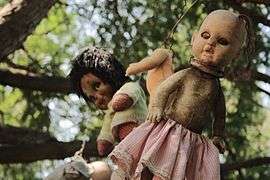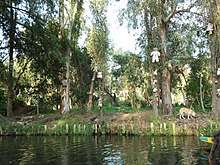The Island of the Dolls
The Island of the Dolls (La Isla de las Muñecas), located in the channels of Xochimilco, south of the center of Mexico City, very close to the Estadio Azteca football stadium, is a chinampa of the Laguna de Teshuilo and one of the main attractions of the channels. Philip dolls of various styles and colors are found throughout the island, originally placed by the former owner of the island, Julián Santana Barrera. Julián believed that dolls helped to chase away the spirit of a girl drowned years ago. Santana Barrera died in 2001 of a heart attack. Sources say he was close to the same spot where the girl drowned.[1]

History

The Island of the Dolls, originally owned by Julián Santana Barrera, is full of dolls hanging from trees and buildings covered with cobwebs and insects. The place was named during the 1950s when the owner began to hang them as protection against evil spirits. Santana was a neighbor of the Barrio de la Asunción, where he used to go to drink pulque after having sold his vegetables, until, due to superstitions, he began to preach the Bible, being expelled from the sector.[2][3]
According to legend, a young woman drowned entangled among the lilies of the canal and her body was found on the banks of the Santampa chinampas. Don Julián began to experience inexplicable situations so, terrified, he placed dolls that he found in the garbage or in the canals of Cuemanco with the idea that they would scare the soul of the young woman who would cry out "I want my doll". He also found a doll floating nearby and, assuming it belonged to the deceased girl, hung it from a tree as a sign of respect.[4] After this, he began to hear whispers, footsteps, in the darkness even though his hut—hidden deep inside the woods of Xochimilco—was miles away from civilization. Driven by fear, he spent the next fifty years hanging more and more dolls, some missing body parts, all over the island in an attempt to appease what he believed to be the drowned girl's spirit.[5]
In 1987, an eco-tourist rescue was made and the island was found covered with water lily. Since then and after the death of Don Julián, the chinampa became a place of great tourist affluence. The place gained fame after 1943, when Mexican filmmaker Emilio Fernández filmed María Candelaria there, with Dolores del Río and Pedro Armendáriz as protagonists.[6] A significant number of international and local channels have featured articles on the island, including The Huffington Post, Travel Channel and ABC News.[7][8][9]
After Barrera’s death in 2001—his body reportedly found in the area where he found the girl’s body fifty years before—the area became a popular tourist attraction where visitors bring more dolls. The locals describe it as "charmed"—not haunted—even though travelers claim the dolls whisper to them. Professional photographer Cindy Vasko visited the island in 2015 and described it as the "creepiest place [she has] ever visited". The excursion began through maze-like canals, surrounded by lush greenery and singing birds, but soon her boat was slowed down by a swarm of lily pads and the canal fell ominously silent. She told MailOnline: "At the end of the journey, the trajinera turned along a bend in the waterway and I was struck by a surreal vision of hundreds, maybe thousands, of dolls hanging from trees on the tiny island."[5] The dolls are still on the island, which is accessible by boat. The island was featured on the Travel Channel show Ghost Adventures and the Amazon Prime show Lore. It was also featured in BuzzFeed Unsolved.[10]
Access to the island
The island of the dolls is an hour and a half from Embarcadero Cuemanco. The only access is via trajinera. Most rowers are willing to transport people to the island, but there are those who refuse due to superstitions.[4] The journey, approximately one hour, includes a tour of the Ecological Area, the Ajolote Museum, the Apatlaco Canal, the Teshuilo Lagoon and the Llorona Island.[3]
In addition to hundreds of dolls, the island also contains a small museum with some articles from local newspapers about the island and the previous owner. There are a store and three rooms, one of which seems to have been used as a bedroom. In this room is the first doll that Julian collected, as well as Agustinita, his favorite doll.
Some of the visitors place offerings around this doll in exchange for miracles and blessings, some others change their clothes and maintain it as a form of worship.
References
- Hasnain, Muhammad. "Island of Dolls Mysterious islands". Retrieved 2020-06-20.
- "La Isla de las Muñecas: Mística experiencia". Archived from the original on 2015-09-27. Retrieved 2018-08-24.
- "Los canales de Xochimilco". Pisodeexhibicion.com. Retrieved 1 December 2018.
- "Isla de las Muñecas (Island of the Dolls) in Mexico - Island of the Dolls". Isladelasmunecas.com.
- "Island of the Dolls: Creepy shrine to girl now a grim tourist trap". Metro.co.uk. 28 June 2014.
- "La "Isla de las Muñecas" causa terror en Xochimilco México". Rinconabstracto.com. 15 November 2011.
- Strutner, Suzy (14 August 2014). "Isla De Las Munecas Is The Island Of Decapitated Dolls From Your Nightmares". Huff Post.
- "Island of the Dolls". Travel Channel.
- News, ABC. "Doll Island Is Both Haunting and Charming". ABC News.
- Flores Farfán, Sebastián (April 17, 2001). "Murió el señor de las Muñecas de Xochimilco" [The man of the Dolls of Xochimilco died] (in Spanish). Xochimilco, Mexico City: Borough of Xochimilco. Retrieved February 25, 2011.
External links
- Phil Torres and Jessica Chobot visit the Island of the Dolls